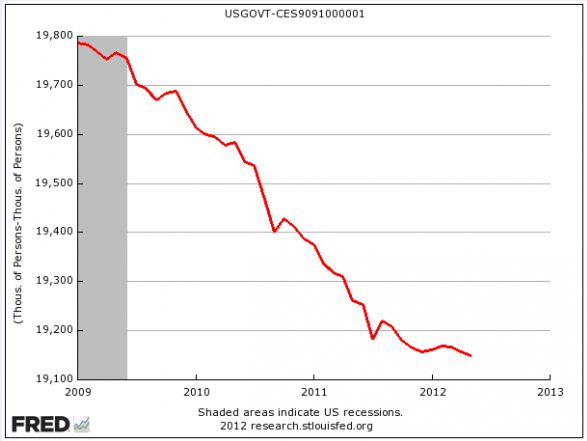In which the retiring Arizona senator characterizes our recovering economy as half-dead and proposes that we should turn it back over to the Republicans, who will finish it off with a bullet to the head.
He starts with the monthly employment report, that is the unexamined bottom-line number of 80,000 jobs gained (like, new jobs for everyone in the quad-city area in a month), characterizing it as "disappointing." This presumably opposed to the end of the Bush administration, where we started losing twice that many a month.
I get it, if we want to put the zoom back in the economy and make more money for the rich white guys that might trickle down to us peons, we want to see bigger employment numbers, sure.
But let's bust out some figures to get a little clearer idea of what's actually going on.
The number of people employed in the private sector has broken through its level at the beginning of the Obama administration and is steadily clocking upward:

Surprised? I was. That's right, private-sector employment has fully recovered and is gaining strength, with about 3 million people hired the past year.
So why is our unemployment number still high? Take a look at state and local public-sector jobs — cops, firemen, teachers, administrators, builders, maintenance workers, etc:
Check that scale above. Since '09 700,000 people have been pushed out of the public sector and the trend is still downward.
It gets worse. The chart below counts federal employees. (The spike was census hiring.)
That's another 200,000 jobs lost, and trending down again.
So our overall employment problem is clearly in the public sector, where states, municipalities, school districts and federal agencies have been laying off droves of people.
These charts are from a
24-chart presentation on Business Insider that gives a very solid, graphic perspective on these cross-currents in our economy. Worth a look.
 |
| Eating our brains since '87. |
Now, class, who's responsible for this public-sector collapse in employment and investment? Right, it's the critters in Congress who've demanded their pound of flesh in the form of shrinking government — critters not at all unlike our own Senator Kyl — as well as Republican governors, legislators, county officials and city councillors who have insisted on cutting jobs willy-nilly rather than do anything to shore up revenues and maintain the vital services that public employees provide.
The result is a national malaise and a more or less stagnant situation for Main Street while Wall Street and International Street rake in hyperbolically increasing profits.
It's a zombie economy, maybe, and we're doing something wrong, absolutely. But I think it's listening to ideological zombies like Mr Kyl. Can we please stop now?











